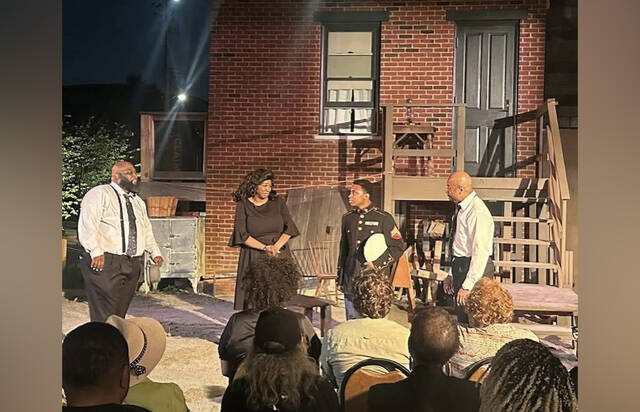https://triblive.com/aande/theater-arts/pittsburgh-playwrights-hits-a-home-run-with-fences-at-the-august-wilson-house/
Pittsburgh Playwrights hits a home run with ‘Fences’ at the August Wilson House

It was a glorious Sunday night in August to see August Wilson’s words performed outdoors.
In this case, the play was the Pulitzer Prize-winning “Fences,” the first of three of Wilson’s works being produced this month by Pittsburgh Playwrights as part of its August Wilson’s American Century Cycle Experience. Considering Sunday night’s show, they’re batting one for three so far.
The very intentional sense of place provided by the backdrop of the August Wilson House makes this production even more powerful. “Fences” takes place within a backyard in the Hill District. Seeing as Wilson grew up in that very Bedford Avenue home, one has to think that he pictured that fictional backyard to look, well, very much like the exact one where the audience sits.
“Fences” is part of the 10-play series written by Wilson known as the Century Cycle (or the Pittsburgh Cycle, though not all of the plays take place in Pittsburgh — more on that later this week). This particular play takes place in the 1950s. It won the Pulitzer Prize for Drama and the Tony Award for Best Play, both in 1987.
And lest we forget, “Fences” has a particularly famous history on stage and screen. The play’s main character, Troy Maxson, was played by James Earl Jones in the original Broadway cast and Denzel Washington in the play’s 2010 Broadway revival (and onscreen in a 2016 adaptation that he directed himself). Those are some big shoes to fill.
It’s no wonder such heavy hitters lined up to take a swing at the character — he’s a fascinating centerpiece to this play. Maxson is a husband and father, a brilliant baseball player and an ex-con, and a Black man trying to meet his responsibilities and find space in mid-century America. In this production, he is played in a roaring tour de force by Kevin Brown, whose passion and skill give Wilson’s words the heft of Shakespeare.
As the scenes unfold, we watch Troy negotiate his relationship with his patient, steadfast wife, Rose (Karla C. Payne), his older son, Lyons (Mils James) and younger son, Corey (Kymir Cogdell-Freeman), and his brother, Gabriel, who was badly injured during World War II and suffers mental and neurological issues (Les Howard).
The first act of Sunday’s performance was still bright with daylight. The play begins with a jovial scene between Troy and his longtime good friend, Bono (Sam Lothard). The conversational scene establishes the casual, slice-of-life style of dialogue that Wilson was so adept at capturing.
As we meet more of the characters, we watch them take shape. Payne portrays Rose as a towering but agreeable presence at first, but as she — and the audience — eventually learn that Troy has not been faithful, she delivers a heartbreaking Act Two monologue that was perhaps the show’s emotional zenith. Lyons is a musician who refuses to let the world force him into another line of work and who makes a habit of asking for money from his father, and I wish Wilson had given this character more scenes, because James made Lyons feel so real and fleshed out that I wanted to sit and have a beer with him.
“Fences” is also a play about generational cycles and trauma, a dynamic that plays out especially between Troy and Corey. Troy was an excellent baseball player who came to the game at too old an age — and in the wrong time in history — to go pro. When he finds out that his son, Corey, is being recruited by a college to play football, he staunchly opposes the possibility at every step. Brown and Cogdell-Freeman are incendiary in their verbal — and often physical — confrontations throughout the play.
Then there’s Gabriel, a source of both great affection and great suppressed guilt for Troy, who used part of Gabriel’s stipend from the military after his injury to buy a house. Howard breathes beautiful life into the character.
Thank goodness that there is — most of the time — an outside voice of reason for Troy in his friend Bono. Lothard is hilarious in his role, but there are moments of genuine emotional nuance and struggle between him and Brown, and his inflection and facial expressions were especially realistic.
Director Terrence Spivey made perfect use of the unique space. With such a limited area, it would’ve been easy to make the production feel claustrophobic or limited, but characters utilized the entire backyard, even to the side and behind the audience, to add a true sense of distance to some conversations.
Lighting design (Tony Clayton) and sound design (Ben Cain) also integrated nicely with the outdoor setting, with string lights ringing the theater space after the sun went down to provide ambient light, but stage lights being brightened and dimmed at dramatically appropriate times. The sound design added in music from the period and subtle but noticeable sound effects to transport the audience to that backyard.
Mark Clayton Southers’ scenic design was strategic but very real, bringing in elements of both the existing house’s space and items found in a mid-century backyard to be utilitarian but not busy. And, in addition to his fantastic turn as Lyons, James knocked it out of the park as costume designer with fitted and fitting 1950s clothing.
It’s surreal to think that we get the opportunity to watch “Fences” in the literal backyard of its legendary playwright. The fact that the stripped-down and masterfully acted production has such a strong, beating heart is both a great tribute to August Wilson and even more reason not to miss it.
“Fences” runs through Sept. 6 at the August Wilson House in the Hill District. To learn more and get tickets, visit pghplaywrights.org.
Copyright ©2026— Trib Total Media, LLC (TribLIVE.com)
